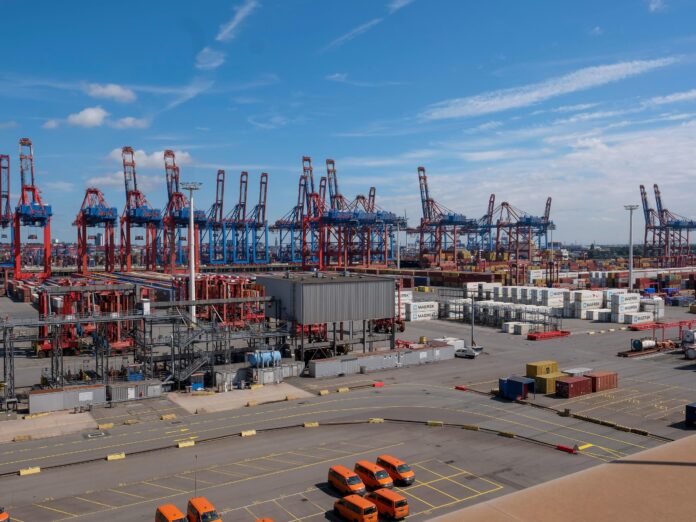Container terminal operator Eurogate Terminals, part of Eurogate Logistics Group, has recruited Deutsche Telekom to build private 5G networks at port terminals in Hamburg, Bremerhaven, and Wilhelmshaven in Germany. The €6.6 million project, funded in part by the German government, will see networks running at each site by the spring of next year (2024). Deutsche Telekom, using Deutsche Telekom lingo, said it was “one of [its] largest campus network projects to date”. The deployments will all use the local 3.7-3.8 GHz band, reserved in Germany for enterprises.
At the same time, Eurogate will use Deutsche Telekom’s public network for inter-terminal logistics and non-critical operations. Deutsche Telekom is to deploy its hybrid Campus-Netz L solution, a “dual slice” solution running on a public network core, which will see its public 5G network at 3.6 GHz made available for Eurogate staff and clients (“for example”), and the Eurogate-owned “purely private 5G network” at 3.7-3.8 GHz offering “committed network resources for Eurogate’s internal data traffic”. Eurogate will have about 190 MHz of bandwidth across two bands.
The project is mostly funded by the German Federal Ministry of Digital Affairs and Transport (BMDV) as part of its ‘Digital Test Fields in Ports’ directive, geared to give the shipping logistics industry a platform to drive operational efficiencies, economic growth, and environmental sustainability, and to work as a collaborative innovation hub to drive Logistics 4.0 – as a function of the country’s broader Industrie 4.0 initiative. BMDV is providing €3.7 million in funding, supported by a further €2.9 million from industrial test provider TÜV Rheinland, as the project sponsor.
The new 5G networks will cover an area of 5.6 million square meters at the three container terminals – split as 2.9 million square meters in Bremerhaven, 1.4 million square meters in Hamburg, and 1.3 million square meters in Wilhelmshaven. Existing mobile systems will be expanded, and three additional outdoor base stations will be added in Bremerhaven and Hamburg, and two will be installed in Wilhelmshaven. The new antennas will attach to existing light poles.
The Campus-Netz L deployment will see Deutsche Telekom deploy a “new network architecture” for the first time, it said, affording Eurogate “lower infrastructure costs and greater technical flexibility… through the use of a virtualized and dedicated campus core network”. A statement explained: “This network architecture enables… control and user plane separation (CUPS) solution. It combines a central 5G core network within the Telekom network with a local user gateway for the customer. This means the 5G campus network is managed centrally by Telekom, but the customer’s own data remains exclusively on-site on its own campus.”
It added: “This provides Eurogate with maximum security without the need to additionally invest in its own complete core network. The local user gateway also ensures low latencies. This is because the data takes the direct route from the end device via the private network to the customer’s IT…. The Campus-Netz L will improve mobile coverage at the container terminals. This will enable the container terminal operator to deploy digital logistics applications even more securely and flexibly in the future – with exclusive bandwidth, high availability and full 5G performance.”
Eurogate will take receipt of exclusive SIM cards with unlimited data flat rates for networked devices. The SIM cards can be administered by Eurogate via a self-service portal – “for the allocation of authorizations or for prioritizing selected data within the private 5G network”. The statement said: “Eurogate benefits from service level agreements at the highest level including fixed contact persons and a 24/7 hotline of Telekom. All local network components, including the user gateway, are also redundant. This ensures… continuous availability and reliability of the network.”
Michael Blach, chairman of the board at Eurogate, said: “An efficient and reliable technical infrastructure is the basis for making container handling at our terminals even more efficient and securing our competitiveness in the long term. Deutsche Telekom… will provide us with the best conditions for further automating our processes and testing innovative logistics solutions based on 5G.”
Hagen Rickmann, managing director for enterprise customers at Deutsche Telekom, said: “The 5G coverage of Eurogate’s container terminals is one of our largest campus network projects to date. It will enable Eurogate to leverage the full potential of 5G to further optimize logistics processes and drive the digital transformation of port terminals. In addition to high-performance 5G and exclusive bandwidth, the network architecture of the three campus networks will offer a particularly high level of control over critical data traffic on the terminal site in the future.”

